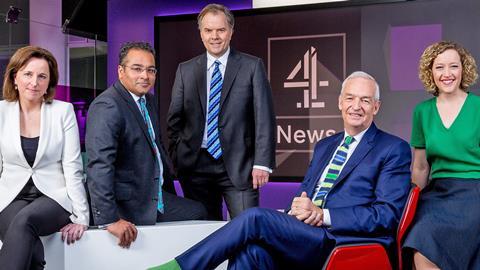The architect of privatisation plan has his say

The Edinburgh TV Festival closed with a debate about the future of Channel 4, featuring culture minister John Whittingdale. Here is everything the architect of the privatisation had to say about the future of C4 and some wider comments on public service broadcasting
Concerns over sustainability
We want to preserve Channel 4 going forward. And we think that – not today, not tomorrow, but in five to 10 years’ time – this model is going to be very difficult to sustain, simply because of the power of and the amount of choice available from the streamers.
Channel 4 is the only channel which is completely dependent on its advertising revenue, and that is already under considerable pressure. And I think a lot of the production companies who are responding [to the consultation] will also say that Channel 4 is telling them its got to cut their budgets again, because the climate and the pressure on C4’s advertising revenues means that they cannot sustain the kind of expenditure in the past.
This is about trying to make sure that Channel 4 can continue to thrive in what is going to be an extremely different television landscape.
…I come back to my concern that if we maintain the status quo, that in the longer term, Channel Four is going to come under greater and greater pressure, and it won’t be able to continue to do all these things that we all recognise and want to see. And so this is about bolstering Channel 4 and making sure that it is capable of surviving in this very different landscape.

The C4 model is going to come under increasing difficulty. With the advent of the streamers the market share is inevitably going to come under greater and greater pressure. And therefore, advertising will be spread more thinly. And I’m afraid that the government is about to make life a lot more difficult for commercial broadcasters, because we are about to say that HFSS foods cannot be advertised on broadcast television before 9pm.
We recognise that is going to have an impact on commercial broadcasting but we believe that there is a case for it in terms of overall public health grounds.
And potentially, we’re looking at the area of gambling advertising, where there is a lot of pressure to restrict. We haven’t yet reached a decision, but you only have to look to at Channel 4 for to see that they have a lot of reliance on that as well.
So a model where you have a channel that is reliant upon the revenue from commercial advertising is going to find it harder and harder. And it is that that is the underlying reason why we think it right now to look at whether or not it wouldn’t have a better future and a different structure.
…I agree that the advertising outlook is going to remain [positive for] TV for a long time to come. But I think part of our concern is that with the number of different channels coming on board, which is increasing daily, it is going to get spread more thinly.
And this is a channel, which has no resilience, it is going to need investment and it simply will not get that in public ownership. It’s not allowed to borrow. And I’m afraid that the prospect of government injecting any more cash into it, particularly in the present climate is not there.
Refocusing the remit
“C4 has always been a combination of very commercial content and US imports, balanced with the extremely distinctive and more edgy content. I think the attraction of Channel 4 for an acquirer is to preserve that – they won’t just want to turn it into an identical commercial broadcaster. The brand value of Channel 4 is one of the attractions of it, and of course, it will be reinforced by the remit.
We’re going to make it clear that if there is a change of ownership, the remit will stay. And therefore, unless they [the buyer] is willing to accept that, then I assume they wouldn’t have expressed an interest in the channel.
“There is a case for looking again, at the remit of Channel 4, and to restoring it to the original purpose, which was to support and build start-ups, and small Indies”
There are a number of areas in which the remit could be changed. To give one example, when C4 was created, the independent production sector didn’t really exist in the UK. It is now very strong, there are some companies that are bigger than Channel 4, they don’t really need much support.
There is a case for looking again, at the remit of Channel 4, and to restoring it to the original purpose, which was to support and build start-ups, and small Indies. We may look at perhaps changing remit, so it is more targeted on those, and not on the kind of big independent production companies which are now successful, and selling programmes to every single broadcaster.
Indie rights and in-house production
What supported the [growth of the] independent production sector, and which will continue, is the terms of trade. That is why the independent production sector has been able to retain its rights and to benefit from those if a programme is successful, and is marketed around the world. We have no current intention of changing the terms of trade.

If Channel 4 were acquired by an owner that did have an in-house production facility, then obviously, they will be able to use it, but there will still be the remit, which will require them to place a proportion of their commissioning outside of that in house production facility. And as I was suggesting, possibly with smaller indies, certainly with those outside London, possibly those in the other nations of the UK. So all of those things can be addressed.
“I think there is a role to continue to support small start-ups and perhaps some of the indies who specialise in that more minority of programming”
In terms of the independent production sector, as I said earlier, and I think that it has changed so much in the sort of 40 years since Channel Four has been in existence. And All3Media and Endemol Shine [sic] do not need support from a state and broadcaster. They are doing exceptionally well.
I think there is a role to continue to support small start-ups and perhaps some of the indies who specialise in that more minority of programming. And that is something that we will look at adapting Channel Four to do.
Principles of public service broadcasting
I regard the provision of public service news is absolutely a fundamental part of being a public service broadcaster, it applies to all the PSBs. And I absolutely believe it needs to continue. It’s interesting you mentioned ring fencing the budget, because Channel Four has cut that news budget quite significantly, and there is no immediate sign of it going back up again.

So it isn’t a question of preserving, it’s potentially about an alternative owner with deeper pockets being able to invest more into news. [News] is something that would be part of any potential contract, which was drawn up on part of the public service. Because news is absolutely fundamental to what public service broadcasting is all about.
…Public service broadcasting and what it delivers is going to change, because some of the things which it was originally established to deliver are already being supplied in large quantity by the market.
One of the things the public service broadcasting panel has been debating, in some fascinating discussions, is what are the things that the public service broadcasters do that we need to try to preserve. News is one of them. It’s always going to be a core provision of public service broadcasting.

If you look at Netflix, you’ve got a series like Sex Education that was made in Britain and set in Britain, but it is not obviously British. You can watch that programme for several hours and not realise that it’s supposed to be set around a British school, rather than the American school. And therefore, the uniquely British quality of programmes is something which we have been thinking about, and how you would continue to have the public service broadcasters to deliver that.
In a world where a lot of the content is not necessarily targeted at Britain, it’s targeted around the world, that’s very difficult to deliver. [Ofcom’s] job of actually measuring the Britishness of a programme is quite a quite a hard challenge, so you have to discuss what metrics to use.
“If prominence has any importance it’s because we think that the public service broadcasters need to have an advantage over the others for reasons which are for the public benefit”
That’s the debate we’re having, about what the public service broadcasters are going to need to concentrate on delivering in a world which is completely different to the past. Prominence is certainly a part of [that debate], but if prominence has any importance it’s because we think that the public service broadcasters need to have an advantage over the others for reasons which are for the public benefit. And the reason for that is because they need to be delivering something which you can’t get elsewhere.
I think it inevitable that certain trends, which are now already clearly visible will continue. One is the switch away from linear viewing. The second is in the longer term, the decline in willingness to pay the BBC licence fee. And those are going to put real challenges on the all of the UK public service broadcasters.
Timetable
We have said that our ambition is to have a media bill in the next session of Parliament. Prominence will certainly be a part of that, as the government has accepted the arguments for strengthening those requirements.
The decisions we make about Channel 4 will form part of [that bill] and also, as you may be aware, we are consulting on bringing in some regulatory obligations on the streamers to sort of give them basic standards, which are the moment they are not required to meet. So it it quite a lot of different areas of policy regarding the future of the PSBs and media more generally, that we need to legislate on. And I would expect that to be next next session.
We will be publishing some kind of white paper probably later in the year towards the autumn in which we’ll set out what we intend. But certainly at the moment our thinking is that there will be a single media bill.
We’ve made it absolutely clear, we haven’t reached any decisions yet [on the future of C4 and some other issues]. On other areas like prominence, we have reached decisions in principle and yes, it is now being looked at in terms of the drawing up the detailed legislation.
We’re not going to resolve this by this time next year. It’s going to take some time, even if we do decide to introduce a bill, we will barely have started debating it in Parliament. So I’ve no doubt we’ll be continuing to have this same discussion near this time.
I think there’s a debate about how we sustain public service broadcasting which is only just beginning. And I’ve no doubt we will be talking about it in a year’s time and probably at Edinburgh for many years to go.

Broadcast’s Not 4 Sale anti-privatisation campaign has attracted signatories from 160 indie bosses, along with a clutch of industry-wide organisations.
If you would like to join email not4sale@broadcastnow.co.uk indicating whether you are joining in a personal capacity or signing up your business, to enable Broadcast to highlight each area when publishing the results.
































No comments yet